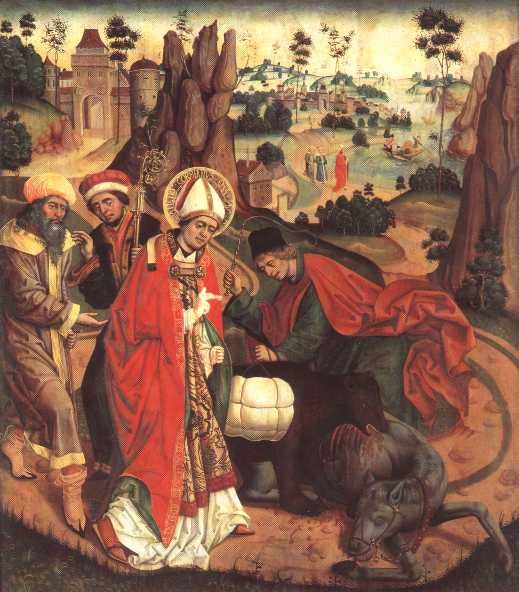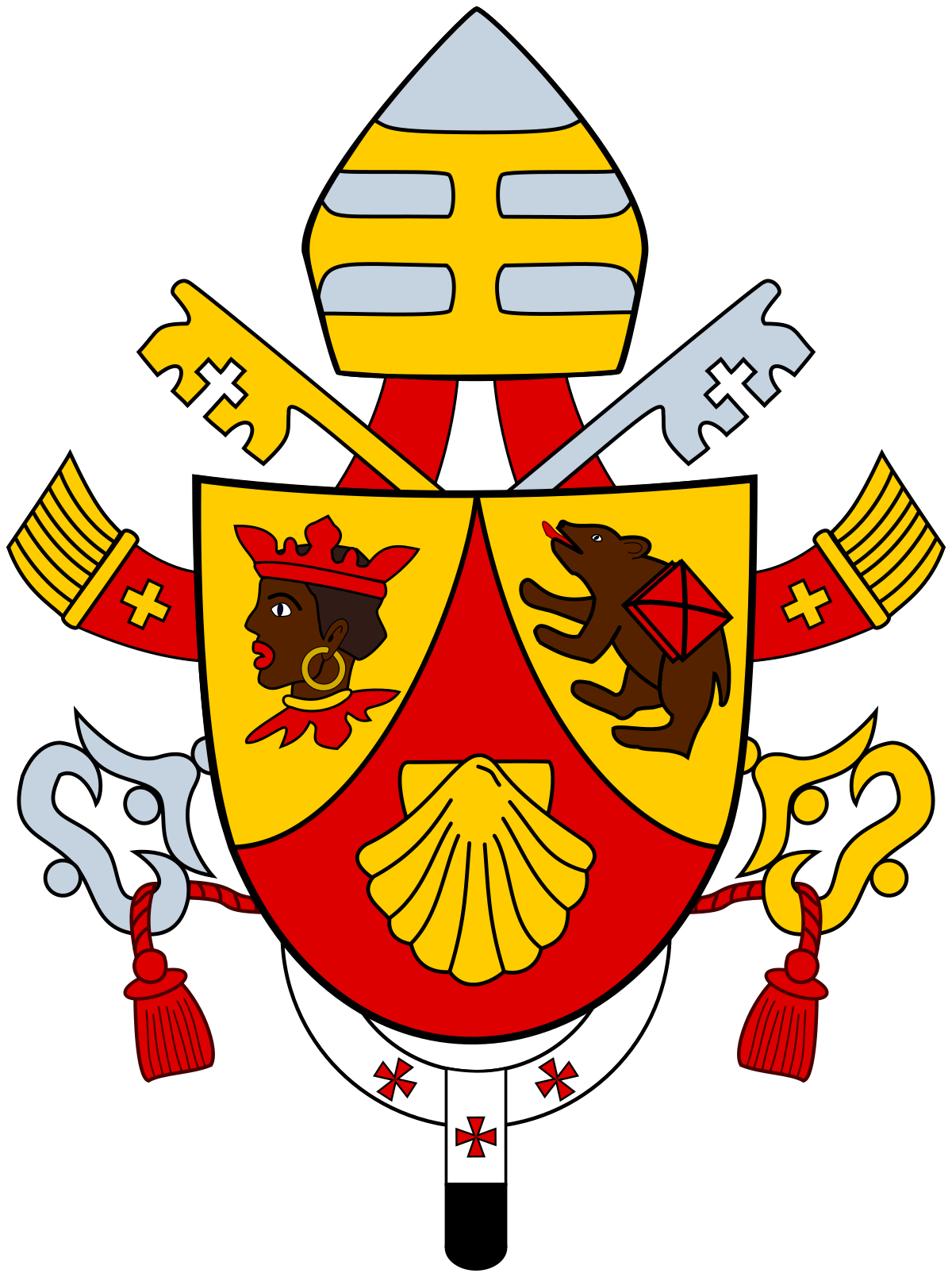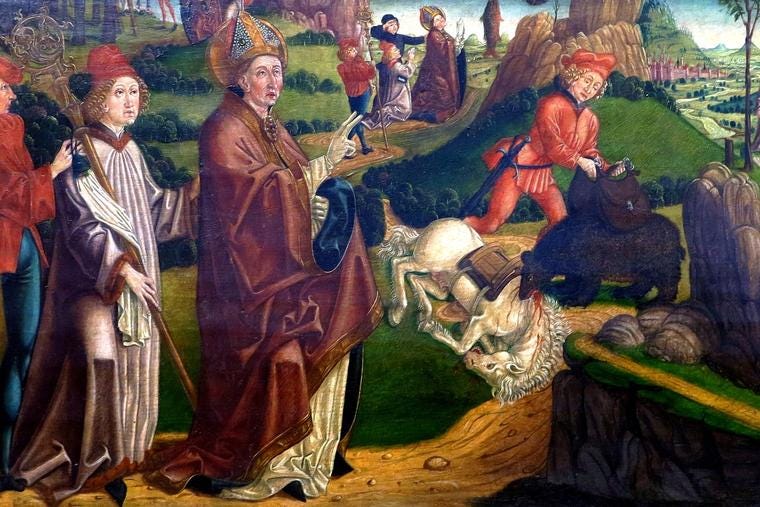Joseph Ratzinger/Benedict XVI’s Coat of Arms contains three images — all of them somewhat strange. Take a look:
First, we see the Crowned Moor of Freising. Traditionally part of heraldry in Europe, and a longstanding image in the diocese, the actual origins of the Moor are unknown. Ratzinger views the image, that of a freed slave, as an image of the universal Church (Christ came for all and all have something to offer — a mutual enrichment). The second image is the scallop shell, which has always been associated with pilgrimage, and with Baptism, the point of origin for the pilgrimage of Christian life.
Finally, we come to the burdened bear. This image, again tied to the Diocese of Freising in Germany, is one of St. Corbinian’s bear. Tradition has it that as the hermit Corbinian traveled from his native France on pilgrimage to Rome, his horse was attacked by a bear. Corbinian ordered the bear to carry his load to Rome, which the bear did, before being released by Corbinian in Rome. Corbinian was then commissioned by the Pope to found a diocese in Bavaria, which would become the Diocese of Freising.

An Allegory for Discipleship
Ratzinger finds his own life in the story of the bear. Recall that Ratzinger had set out on an academic trajectory before being “burdened” by the episcopacy, and then by being named Prefect of the Congregation of the Doctrine of the Faith (furthermore, he would be named to the See of Peter in 2005).
In Milestones, his early memoir, Ratzinger provides a striking treatment of Corbinian’s bear in light of his own life. He bases this on a self-reflection by St. Augustine, his theological hero. And it opens out into a beautiful meditation on what a life of humble service to the Lord looks like.
Augustine meditates on Psalm 73, which opens with the Psalmist’s lament for the apparent fortune of the cynics and non-believers, while his life, faithful-though-he-is, is laden with hardship and apparent failure.
Because I was envious of the arrogant
when I saw the prosperity of the wicked.
For they suffer no pain;
their bodies are healthy and sleek.
They are free of the burdens of life;
they are not afflicted like others.
Thus pride adorns them as a necklace;
violence clothes them as a robe.
Out of such blindness comes sin;
evil thoughts flood their hearts.
They scoff and spout their malice;
from on high they utter threats.
They set their mouths against the heavens,
their tongues roam the earth.
…
Is it in vain that I have kept my heart pure,
washed my hands in innocence?
For I am afflicted day after day,
chastised every morning.
Then the Psalmist enters the sanctuary and realizes his mistake. He understands the end of the wicked — he sees their slippery slope:
You set them, indeed, on a slippery road;
you hurl them down to ruin.
How suddenly they are devastated;
utterly undone by disaster!
They are like a dream after waking, Lord,
dismissed like shadows when you arise.
Next, we read about the Psalmist’s remorse at his own despair, and temptation to move from the ways of the Lord:
Since my heart was embittered
and my soul deeply wounded,
I was stupid and could not understand;
I was like a brute beast in your presence.
At the point of utter discouragement, the Psalmist finds himself again, while in the sanctuary, in the presence of God. Here, he understands the insignificance of material wealth and success, and recognizes what is truly necessary and what brings salvation: being in God’s presence. God’s presence pricks the Psalmist’s heart — and he is left stupid before him, like a beast.
The Psalmist concludes, that despite the many trials:
I am always with you;
you take hold of my right hand.
With your counsel you guide me,
and at the end receive me with honor.
Whom else have I in the heavens?
None beside you delights me on earth.
Though my flesh and my heart fail,
God is the rock of my heart, my portion forever.
But those who are far from you perish;
you destroy those unfaithful to you.
As for me, to be near God is my good,
to make the Lord GOD my refuge.
I shall declare all your works
in the gates of daughter Zion.
All I want is to be with you, and in being with you, I will become your beast of burden. The converse is also true: It is by becoming your beast of burden that I can be with you, remain with you.
Augustine notes that in Latin, the word “beast” refers primarily to a draft animal used for farm work. Augustine sees in this an image of the episcopacy, outfitted with its own burdens. So Augustine concludes the following about his own life: “A draft animal am I before you, for you, and this is precisely how I abide with you.” Augustine had chosen to be a scholar, but God had chosen for him a life in which Augustine would bear His burden, carry His load, carry His responsibility. Though he often protested, Augustine found in this psalm the antidote to all bitterness, as the draft animal is always with the master, serving him, and in this way is always in the master’s hand, is always near the master, performing a humble, yet essential, service. Ratzinger, reflecting on this, says, “He could not be closer to his Lord or be more important to him.”
The Burden of the Christian Life
To be a Christian is to follow Christ. To follow Christ is to share in his mission. Sharing in Christ’s work, his load, his thirst for souls, is a burden. It’s a beautiful one, to be sure, but it is a burden. Though different by order, every baptized person is invited, is called to share in the load.
Just as the bear took the place of Corbinian’s horse, or donkey, just as the bear became the donkey — so too this is what we have become, this is what we are called to be — and this is the way for us to always be with him. For this reason Ratzinger closes by saying, “I have become your donkey, and in just this way I am with you.” Though he was speaking specifically about the episcopacy and the eventual call to Rome, we might, in our own way, say, “We have become your donkeys, and in just this way we are with you.”






